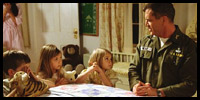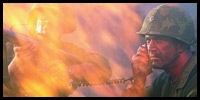
 |
We Were Soldiers (2002) Directed by Randall Wallace Cast: Mel Gibson, Sam Elliott, Madeleine Stowe, Barry Pepper, Greg Kinnear, Chris Klein, Keri Russell, Don Duang, Josh Daugherty, Mike White, Marc Blucas, Mark McCracken, Edwin Morrow, Simbi Khali, Dylan Baker, Jsu Garcia, Desmond Harrington, Ryan Hurst. 2002 – 138 minutes Rated: Reviewed by Dustin Putman, March 1, 2002.  Because the United States lost the Vietnam War, there has been a tendency to overpoliticize this section in our recent history. As the soldiers who had fought for the country returned home, they were wrongfully met with disdain and shame and, even today, many people have a difficult time talking about Vietnam because of the overall loss that it entailed. Based on the book, "We Were Soldiers Once...and Young," by Hal Moore and Joe Galloway, "We Were Soldiers" is an important motion picture that tells a simple, truthful story about the Vietnam War, and treats the subject matter not as something to be ashamed of, but with a hopeful honorability.
Because the United States lost the Vietnam War, there has been a tendency to overpoliticize this section in our recent history. As the soldiers who had fought for the country returned home, they were wrongfully met with disdain and shame and, even today, many people have a difficult time talking about Vietnam because of the overall loss that it entailed. Based on the book, "We Were Soldiers Once...and Young," by Hal Moore and Joe Galloway, "We Were Soldiers" is an important motion picture that tells a simple, truthful story about the Vietnam War, and treats the subject matter not as something to be ashamed of, but with a hopeful honorability.
Primarily set in November 1965, the film tells of the first major battle between American and North Vietnamese troops that officially began the war. Before it reaches this tragic, three-day ordeal in the Ia Drang Valley, we get a glimpse into the lives of a handful of soldiers, most notably Col. Hal Moore (Mel Gibson), the leader of the 1st Battalion of the 7th Cavalry, who tells his men at one point that he will be the first person to set foot on the battlefield, and the last to step off. Moore is a loving, religious family man with a supportive wife, Julie (Madeleine Stow), and a brood of children. Meanwhile, good-hearted Lt. Jack Geoghegan (Chris Klein) has just had his first child with his lovely wife, Barbara (Keri Russell), and fears that going to war may mean never getting to see his baby grow up.  After the cavalry leaves home, the film accurately and uncompromisingly portrays the battle, and the fates of those that fought in it. A major new character unpredictably enters the proceedings in the second half, that of Joe Galloway (Barry Pepper), a photographer who has come to document the war but quickly discovers he is way out of his league. All the while back at their homebase, Julie and Barbara take it upon themselves to personally hand out the dreaded, yellow telegrams to the newly widowed women living near them.
After the cavalry leaves home, the film accurately and uncompromisingly portrays the battle, and the fates of those that fought in it. A major new character unpredictably enters the proceedings in the second half, that of Joe Galloway (Barry Pepper), a photographer who has come to document the war but quickly discovers he is way out of his league. All the while back at their homebase, Julie and Barbara take it upon themselves to personally hand out the dreaded, yellow telegrams to the newly widowed women living near them.
Written and directed by Randall Wallace (1998's "The Man in the Iron Mask"), "We Were Soldiers" is an emotionally draining, expertly made war drama that is, nonetheless, devoid of cynicism. The early scenes depicting the soldiers with their families is vital in developing the characters and forming a bond with them, even if they are filled with an idealism that seems needlessly sugarcoated. Still, the movie is far more satisfying because of this first act than the recent, similar "Black Hawk Down," which lacked the human depth found here.  Because the opening 40 minutes paint a picturesque portrait of the mid-'60s American family, what follows is all the more stirring and tough to endure. The elongated battle scenes are, perhaps, the most bloody and violent ever put to film (surpassing even the D-Day sequence in 1998's "Saving Private Ryan"), with almost non-stop carnage and bloodshed frequently spraying the camera lens. For those that normally are squeamish, particularly when it comes to something as unblinking and realistic as war, "We Were Soldiers" will be difficult to sit through. Even for someone that isn't usually affected by such gory images (like myself), there are numerous spots that left me debating whether to turn away or not.
Because the opening 40 minutes paint a picturesque portrait of the mid-'60s American family, what follows is all the more stirring and tough to endure. The elongated battle scenes are, perhaps, the most bloody and violent ever put to film (surpassing even the D-Day sequence in 1998's "Saving Private Ryan"), with almost non-stop carnage and bloodshed frequently spraying the camera lens. For those that normally are squeamish, particularly when it comes to something as unblinking and realistic as war, "We Were Soldiers" will be difficult to sit through. Even for someone that isn't usually affected by such gory images (like myself), there are numerous spots that left me debating whether to turn away or not.
Mel Gibson (2000's "What Women Want") is at the top of his game as real-life Col. Hal Moore, displaying all of the extreme and subtle emotions that come with the baggage of the role. Moore is a faithful man who sticks to his word and, even after nonchalantly vowing to not leave any of his men behind, he can't help but be devastated by the death that quickly surrounds him.  Chris Klein (2002's "Rollerball"), a doe-eyed young actor who usually comes off appearing intellectually dim in his roles, surprisingly avoids embarrassing himself as Lt. Jack Geoghegan. Klein is especially effective in those moments where he is forced to reflect on the choices he has made in his career, and the promises he has made to his family. Also quite strong are Sam Elliott (1998's "The Big Lebowski"), as Moore's right-hand man, the no-nonsense veteran Sgt. Maj. Basil Plumley; Barry Pepper (2000's "Battlefield Earth"), as photographer Joe Galloway; Greg Kinnear (2000's "Loser"), as hotshot pilot Maj. Bruce 'Snakeshit' Crandall; and Don Duang, sympathetically treated as the leader of the Vietnamese troops.
Chris Klein (2002's "Rollerball"), a doe-eyed young actor who usually comes off appearing intellectually dim in his roles, surprisingly avoids embarrassing himself as Lt. Jack Geoghegan. Klein is especially effective in those moments where he is forced to reflect on the choices he has made in his career, and the promises he has made to his family. Also quite strong are Sam Elliott (1998's "The Big Lebowski"), as Moore's right-hand man, the no-nonsense veteran Sgt. Maj. Basil Plumley; Barry Pepper (2000's "Battlefield Earth"), as photographer Joe Galloway; Greg Kinnear (2000's "Loser"), as hotshot pilot Maj. Bruce 'Snakeshit' Crandall; and Don Duang, sympathetically treated as the leader of the Vietnamese troops.
The two central female parts go to Madeleine Stowe (2002's "Impostor"), as Julie Moore, and Keri Russell (TV's "Felicity"), as Barbara Geoghegan. Stowe and Russell are very good, but their scenes are shortchanged and their characters not fully written. While the first scene in which they give out a telegram to the single black woman on the base (marvelously portrayed by Simbi Khali) is heartbreaking, an even more pivotal scene between Julie and Barbara near the end is a major disappointment in the way it cuts off before resonating emotionally with the viewer.  If the penultimate moments of "We Were Soldiers" are a little too obvious and predictable, they do not take away from the lasting effect that the film powerfully holds. As far as war movies go, this is the best studio effort since Terrence Malick's brilliant 1998 picture, "The Thin Red Line." Under the helm of Randall Wallace, "We Were Soldiers" treats its downbeat subject matter and each of the characters with a fairness and dignity that allow for a truly memorable, tragic, and inspiring cinematic experience.
If the penultimate moments of "We Were Soldiers" are a little too obvious and predictable, they do not take away from the lasting effect that the film powerfully holds. As far as war movies go, this is the best studio effort since Terrence Malick's brilliant 1998 picture, "The Thin Red Line." Under the helm of Randall Wallace, "We Were Soldiers" treats its downbeat subject matter and each of the characters with a fairness and dignity that allow for a truly memorable, tragic, and inspiring cinematic experience.
©2002 by Dustin Putman |
 |













